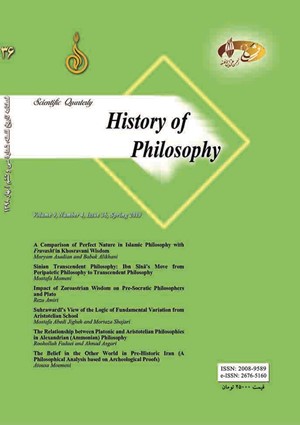نسبت ميان فلسفه افلاطون و ارسطو در مکتب اسکندراني (آمونيوسي)
الموضوعات :روح الله فدائی 1 , احمد عسگری 2
1 - دانشگاه تربیت مدرس
2 - دانشگاه شهید بهشتی
الکلمات المفتاحية: افلاطون ارسطو مکتب اسکندراني آمونيوس ,
ملخص المقالة :
از قرن اول قبل از ميلاد مکتب افلاطوني همواره با فلسفه مشاء مواجهه داشته است. در اين ميان، جرياني که ايده تلفيق اين دو مکتب را داشت در آمونيوس ساکاس به اوج رسيد. اين ايده در فرفوريوس محقق شد و از آن پس فلاسفه افلاطوني به جمع ميان افلاطون و ارسطو اهتمام ويژه ورزيدند. ليكن سوريانوس و برقلس، از اين جريان فاصله گرفتند و در مواضعي مهم ارسطو را نقد کرده و فکر او را در مقابل رأي افلاطون تلقي نمودند. بعقيدة برقلس، ارسطو عالم مثل را انکار کرده و از فهم عليت فاعلي الهي عاجز مانده و از اينرو فاعليت او را در عليت غايي منحصر نموده است. علاوه برآن، عقل را به مقام مبدأ اول و واحد علي الاطلاق ارتقا داده كه اين خود خطايي خطير و انحرافي بزرگ بود. در مقابل بواسطه تلاشهاي آمونيوس هرميايي و شاگردان وي، مکتب فلسفي اسکندريه شکل گرفت که طرح جمع افلاطون و ارسطو را بشکل نظاممند پي گرفت و به اوج خود رساند. سيمپليکيوس بعنوان يکي از برجستهترين فيلسوفان اين حوزه، متأثر از تعاليم آمونيوس هرميايي، آنچه را برقلس موارد اختلاف افلاطون و ارسطو ميدانست، بنحوي تحليل و تفسير نمود که به مواضع اشتراک و اتفاق بدل شود. وي اين کار را نه به اقتضاي ذوق و بموجب تفنن فکري، بلکه بواسطه الزامات فلسفي پيش رو انجام داد.
Alcinoos (1990) Enseignement des doctrines de Platon, Pierre Louis, Paris: Les Belles Lettres.
Alcinoos (1993) The Hand Book of Platonism, Trans. by John Dillon, Oxford University Press.
Ammonius (1991) On Aristotle's Categories, S. M. Cohen, & G. B. Matthews, Trans, New York: Cornell University Press.
Aristotle (1831) Aristoteles Graece, Immanuelis Bekkeri (ed.), Berolini: Apud Georgium Reimerum.
Aristotle (1984) The Complete Works of Aristotle, J. Barnes (ed)., New Jersey: Princeton University Press
Blank, D. (2010) “Ammonius Hermeiou and His School”, in L. Gerson (ed.), The Cambridge History of Philosophy in Late Antiquity, Vol. 2, New York: Cambridge University Press.
Chiaradonna, R. (2016) “Porphyry and the Aristotelian Tradition”, in A. Falcon (ed.), Brill’s Companion to the Reception of Aristotle in Antiquity, Leiden: Brill.
D'Hoine, P. (2016) “Syrianus and Proclus on Aristotle”, in A. Falcon (ed.), Brill’s Companion to the Reception of Aristotle in Antiquity, Leiden: Brill.
Golitsis, P. (2016) “Simplicius and Philoponus on the Authority of Aristotle”, In A. Falcon (ed.), Brill’s Companion to the Reception of Aristotle in Antiquity, Leiden: Brill.
Griffin, M. (2016) “Ammonius and the Alexandrian School” in A. Falcon (ed.), Brill’s Companion to the Reception of Aristotle in Antiquity, Leiden: Brill.
Hadot, I. (2015) Athenian and Alexandrian Neoplatonism and the Harmonization of Aristotle and Plato, trans.by M. Chase. Leiden: Brill.
Lloyd, A. C. (2007) The Later Neoplatonists, in A. H. Armstrong (ed.), The Cambridge History of Later Greek and Early Medieval Philosophy, Cambridge University Press.
Menn, S. (2012) “Self-Motion and Reflection: Hermias and Proclus on the Harmony of Plato and Aristotle on the Soul”, in J. Wilberding and Christoph Horn (eds.) Neoplatonism and the Philosophy of Nature, University Press Oxford.
Michalewski, A. (2016) “The Reception of Aristotle in Middle Platonism: From Eudorus of Alexandria to Ammonius Saccas”, in A. Falcon (ed.), Brill’s Companion to the Reception of Aristotle in Antiquity, Leiden: Brill.
Olympiodorus, (1998) Commentary on Plato’s Gorgias, trans. by R. Jackson, K. Lycos, & H. Tarrant, Leiden: Brill.
Opsomer, Jan (2016) “An Intellective Perspective on Aristotle: Iamblichus the Divine”, in A. Falcon (ed.), Brill’s Companion to the Reception of Aristotle in Antiquity, Leiden: Brill.
Plato, (1997) Complete Works, John M. Cooper, (ed)., Indianapolis: Hackett Publishing Company.
Plotinus, (1988) Plotinus: Volume VI, Ennead VI.1-5., trans. by A. H. Armstrong, London: Harvard University Press.
Porphyry, (2014) On Aristotle Categories, trans. by S. K. Strange, Bloomsbury.
Proclus, (1963) The Elements of Theology, trans. by E. R. Dodds, London: Oxford.
Proclus (1987) Commentary on Plato’s Parmenides, translated by Glenn R. Morrow & John Dillon, with introduction and notes by John Dillon, Princeton University Press.
Proclus (2007) Commentary on Plato's Timaeus: Volume 3, Book 3, Part 1: Proclus on the World’s Body, translated with an introduction and notes by Dirk Baltzly, Cambridge University Press.
Proclus (2008) Commentary on Plato’s Timaeus: Volume 2, Book 2: Proclus on the Causes of the Cosmos and its Creation, trans. by D. T. Runia, & M. Share, New York: Cambridge University Press.
Simplicius (2001a) On Aristotle Categories 5-6., trans. by F. de Hass, & B. Fleet, Great Britain: Bloomsbury.
Simplicius (2001b) Simplicius: On Aristotle Physics 8.6-10, trans. by R. D. McKirahan, Great Britain: Bloomsbury.
Simplicius (2003) On Aristotle’s “Categories 1-4”, trans. by M. Chase, New York: Cornell University Press.
Simplicius (2005) On Aristotle On the Heavens 2.10-14, trans. by I. Mueller, Trans, Great Britain: Bloomsbury.
Simplicius (2014) Simplicius: On Aristotle On the Heavens 2.1-9., I. Mueller, Trans. by Great Britain: Bloomsbury.
Sorabji, R. (2016) “Introduction”, in R. Sorabji (ed.), Aristotle Re-Interpreted: New Findings on Seven Hundred Years of the Ancient Commentators, New York, Bloomsbury.
Verrycken, K. (2016) “The Metaphysics of Ammonius Son of Hermias”, in R. Sorabji (ed.), Aristotle Transformed: The Ancient Commentators and Their Influence, New York: Bloomsbury.
Wisnovsky, R. (2003) Avicenna’s Metaphysics in Context, Great Britain: Cornell University Press.


